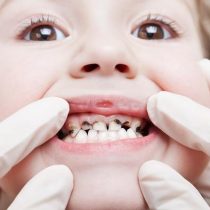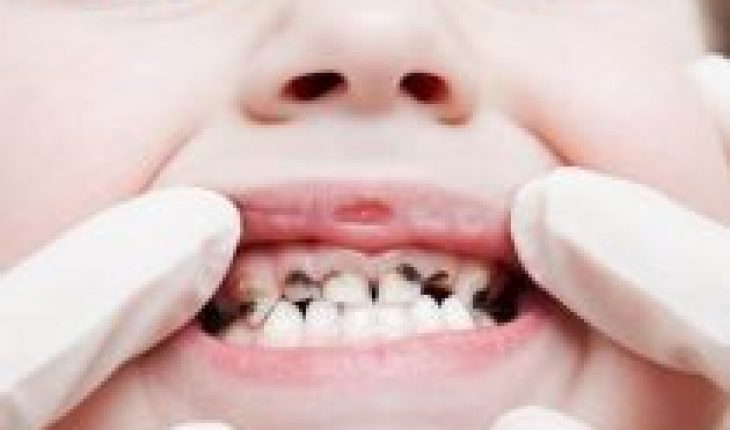
Most of us don’t like to go to the dentist, and we visit it only when it’s urgently needed or when pain compels us. But our teeth can also give us warning signs about problems throughout our body, not just in the oral cavity.
“Most think that teeth and the health of the body have nothing to do with each other, but both are important for our health and are related,” Roland Frankenberger, of the Polyclinic for Dental Conservation, at the University of Marburg, tells DW. Periodontitis, for example, has become a chronic disease that, for example in Germany, affects one in two people. Inflammations of the gums and periodontum – the set of tissues that surround the teeth – are key in the interrelationship between the teeth and the rest of the body. They are produced, above all, by bacteria in dental plaque that can form pockets in the gums where they can reproduce without brake.
“Having moderately severe periodontitis, there is an open wound in the oral cavity, as large as the palm of one hand,” Frankenberger explains. “If someone had such a wound on their back, the doctor would detect it much more quickly and treat it in the right way,” he says. For example, when someone has a wound on their back from lying down too long, an ideal entry for bacteria is formed there, which is immediately seen by doctors, he adds. But in the mouth, that’s different, says the specialist. There, at first no one notices it.
Properly brushing teeth should be learned from an early age and properly at the age of children.
Dental diseases often go undetected
Many patients do not know the correlation between dental health and the health of the rest of the body. When the mouth bleeds when brushing your teeth, most don’t give it importance. However, it should be taken seriously, since, from the oral cavity, bacteria can reach the entire organism through the blood. Periodontitis is always a red flag.
“Between the prevalence of periodontitis, that is, the number of cases, and the cases that are actually treated, there is a big gap,” Frankenberger warns. There are many general practitioners who during their training never heard anything about the interrelation of the denture with the organism. “It should be urgently taught during studies that the oral cavity is not an enclosed space without connection, but influences many places in the body,” he stresses.
If you suffer from periodontitis, the bacteria nest in the oral cavity.
From stress to dementia, diabetes and myocarditis
Even though doctors and dentists have been working interdisciplinary for a long time, the chances of successful treatment are by no means exhausted. The influence of dental health in other areas ranges from joint pains to tinnitus and heart problems. Dental diseases can also cause allergies and rheumatism.
But not only is it necessary to work together with traumatologists and cardiologists, but also to include neurologists. Dementia is another disease that can be caused by problems in the teeth and gums, Frankenberger clarifies. On the other hand, it is clear that dementia cannot be reversed from healthy teeth.
The interaction with diabetes is the most significant. A diabetic’s immune system is weakened, making it easy for bacteria to settle in the oral cavity. Dental disease and diabetes can even be mutually reinforcing, the expert says. “Periodontitis is a risk of diabetes developing, or worsening. But it also can’t be said so easily that if someone has periodontitis it’s because they suffer from diabetes.”
Another important consequence of diseased teeth is that bacteria can reach the blood, penetrate the heart and, from there, for example, cause endocarditis, an inflammation of the heart muscle. If left untreated, that disease can be deadly. That is to say that a periodontitis is much more than just bleeding gums.
There is no need to fear the sound of the lathe. Visiting the dentist and a prophylactic cleaning every six months is the least we can do for our teeth.
Danger for pregnant women
Especially pregnant women are prone to suffer from inflammation in the gums, since their body is exposed to overloads. A periodontitis weakens the body. If not treated quickly, it can increase the risk of preterm birth by up to 7.5 times.
The bacteria spread through the bloodstream to the placenta and can affect the growth of the fetus.
Severe inflammations of the gums can be largely avoided with good oral hygiene. This is not only based on the correct washing of the teeth, but also on a professional dental cleaning and visiting the dentist, both on a regular basis, at least twice a year. The dentist is the one who can best determine if there is something that is not right. The range of possible diseases related to the oral cavity is very wide. New research results are released almost daily, some also on very current issues.
“A Finnish study now showed that patients with periodontitis suffered from a much worse development of COVID-19 than others whose teeth and oral cavity were healthy. This study will soon appear in the journal Clinical Oral Investigations, Frankenberger announces.
Not only the denture, but also the temporomandibular joint is responsible for an intact oral cavity. If that joint presents problems, you can suffer, for example, from neck, head and back pain. The musculature of the jaw always tries to correct postural deformations, for which it contracts and contractures. These contractures can radiate to the spine and shoulders.
But almost no one thinks about teeth when suffering from these difficulties, but often blames for example poor posture in front of the computer. That could be a reason. However, the influence of teeth, oral cavity and jaw on our overall health should not be underestimated.





